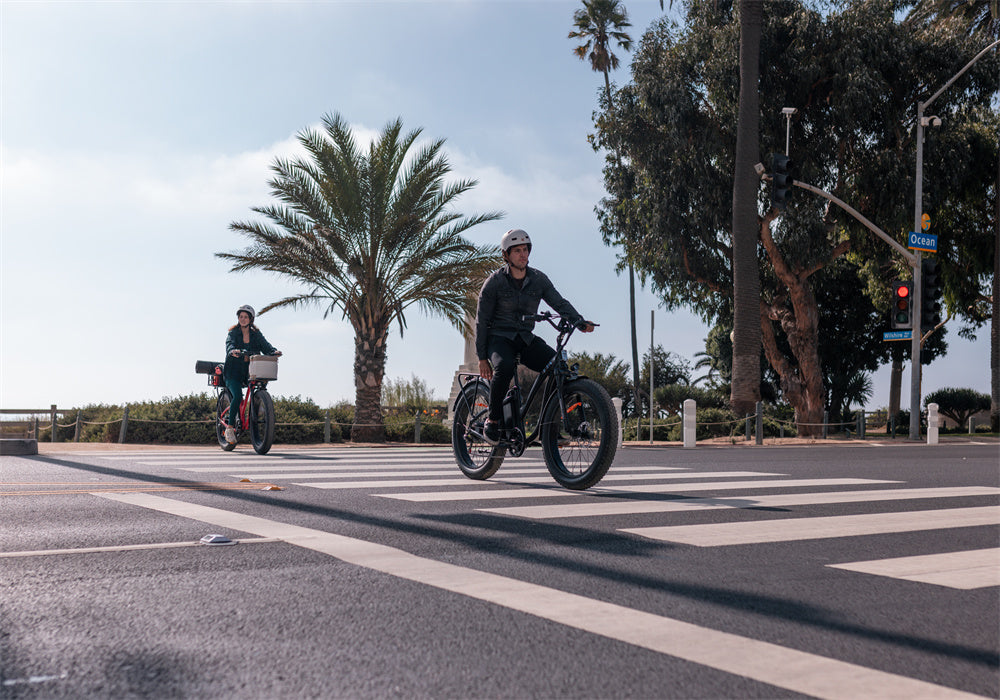In Canada, the legal framework for electric bicycles, also referred to as power-assisted bicycles (PABs), falls under the federal Motor Vehicle Safety Regulations.
These regulations set out the requirements for electric bikes across the country, but provinces and territories have the authority to enforce their own additional rules regarding their use on roads and paths.
According to federal guidelines, an electric bicycle is defined as a two- or three-wheeled cycle that:
-
Is fitted with pedals (for human propulsion)
-
Is powered by an electric motor
-
Has a motor that does not exceed 500 watts of power
-
Has a maximum speed of 32 km/h when powered solely by the motor
Any bike that surpasses these limitations is categorized as a motor vehicle and therefore subject to different laws and requirements, such as licensing, insurance, and registration.
Where Do They Fit
A 750 watt electric bike exceeds the federal power limit for power-assisted bicycles in Canada.
The federal limit, set at 500 watts, is designed to ensure that e-bikes remain distinct from motor vehicles, which require more stringent regulations.
This means that an e-bike with a motor rated at 750 watts would not be considered a PAB under Canadian federal law, potentially subjecting it to motor vehicle classification.
While federal regulations establish the framework, the enforcement and specifics can vary by province and territory.
Let’s explore how the 750 watt bike fits into the legal landscape across different regions.

Provincial Regulations for 750 Watt Electric Bike
Each province and territory in Canada has the power to enforce its own rules regarding the use of bikes on roads, trails, and public spaces. These rules often mirror federal standards but can also introduce additional restrictions or allowances.
Ontario
In Ontario, the law is clear that power-assisted bicycles must comply with the federal definition.
Therefore, a 750 watt electric bicycle would not be legal for use on public roads and trails.
E-bikes in Ontario must have a motor that does not exceed 500 watts and cannot exceed a top speed of 32 km/h on motor power alone.
Riders are also required to be at least 16 years old and must wear a helmet.
British Columbia
Similarly, in British Columbia, bikes must have a motor rated at no more than 500 watts to be considered legal on roads and public spaces.
A 750 watt Ebike would be classified as a motor vehicle, and therefore, you would need to meet the requirements for licensing, insurance, and registration to legally ride it.
Quebec
In Quebec, the rules are comparable, with 500 watts being the upper limit for motor power on bikes.
Additionally, Quebec requires motorized bike users to wear a helmet, and e-bikes are prohibited from riding on highways or expressways.
Alberta
In Alberta, the 500-watt power limit applies, and 750 watt electric bikes would be considered motor vehicles, requiring appropriate licensing and registration.
E-bike riders must be at least 12 years old and helmets are mandatory for those under 18 years old.
SEE ALSO Could You Pedal Electric Bike

Are There Any Exceptions for 750 Watt E-Bikes
Despite the uniformity of the 500-watt limit across the provinces, some areas may allow 750 watt bikes for off-road use or on private property.
However, this would not apply to public roads, bike lanes, or trails.
If you're planning to use a 750 watt electric bicycle for recreational purposes on private land or in specific designated areas, you may not face the same legal restrictions.
Nevertheless, it is important to verify local bylaws and rules to ensure compliance.
In terms of commercial use, certain jurisdictions may allow for higher wattage bikes, but these cases are typically tightly regulated, requiring permits, specific rider qualifications, and operational restrictions.
Consequences of Riding a 750 Watt Electric Bicycle Illegally
If you choose to ride a 750 watt ebike on public roads or trails in Canada without adhering to the licensing and registration requirements, you may face legal consequences. These can include:
-
Fines: Riding an ebike that exceeds the legal power limits can result in fines. In some provinces, these fines can be quite substantial.
-
Confiscation: In cases of repeated offenses, law enforcement may confiscate your electrical bicycle if it is found to be non-compliant with local laws.
-
Insurance and Liability Issues: Since a 750 watt electric bicycle may be classified as a motor vehicle, you could be held liable for any accidents or damages caused while riding it. Lack of proper insurance may leave you exposed to significant financial risk.
How to Ensure Your E-Bike Is Legal in Canada
To ensure your bike complies with Canadian laws, it's important to verify the specifications before purchasing. When shopping for bikes, check the following details:
Motor Power: Ensure that the motor does not exceed 500 watts.
Top Speed: The electric bike should not exceed 32 km/h under motor power alone.
Pedals: The bike must have operable pedals for human propulsion.
By choosing an electric bike that meets these criteria, you can enjoy the freedom and convenience of an bike without worrying about breaking the law.
Final Thoughts
The bottom line is that 750 watt electric bikes are not legal for use on public roads and trails in Canada under current federal and provincial regulations.
With the legal power limit set at 500 watts, e-bikes with higher wattage are classified as motor vehicles and subject to different, more stringent requirements.
If you're planning to purchase an e-bike for use in Canada, it's crucial to choose a model that complies with these laws to avoid fines, penalties, or even confiscation of your bike.
If you’re interested in a high-performance e-bike that meets Canadian standards, there are many options on the market that offer powerful yet legal alternatives with 500-watt motors, allowing you to ride safely and confidently.
FAQs
What is the maximum legal wattage for an e-bike in Canada?
The maximum legal wattage for an e-bike in Canada is 500 watts, with a top speed of 32 km/h under motor power.
Do I need a license to ride a 750 watt e-bike in Canada?
Since a 750-watt e-bike is considered a motor vehicle, you would need a license, registration, and insurance to legally operate it on public roads.
What happens if I get caught riding a 750 watt e-bike illegally?
You could face fines, confiscation of your e-bike, and possible legal liability if you are involved in an accident while riding an illegal 750-watt e-bike.
Recommended Reading
What Are the Benefits of Riding Ebikes?Could You Pedal Electric Bike
Guide to E-Bike Touring Across the Country
11 Cycling Tips for Beginners
Electric Bike Tires: Should You Choose Thin or Fat?








Share:
8 Best Bike Trails in Canada
Are Electric Bikes Popular in Canada?